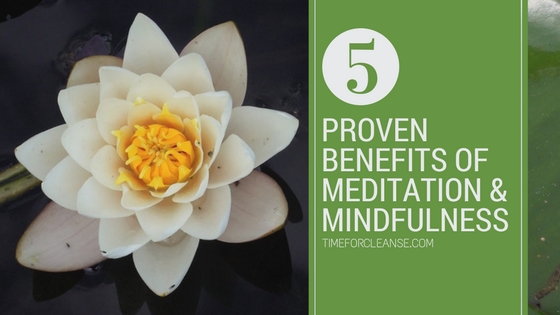
Meditation is nothing new. The ancient process of centering your mindfulness is seen through history in the 5th and 6th century Buddhist and Taoists, and recently it’s had a popularity surge in modern culture. Thanks in part to several large studies that tout the health benefits of mindful meditation, more people are using the technique in an effort to better their well-being.
Here we’ll talk about the particulars of mindfulness meditation, the health benefits to expect and give you four helpful tips to get started.
Quiz: Is Your Body TOXIC? Take the Test...
(get your free personalized report)
What is Mindfulness Meditation?
Meditation is the act of devoting your focus to one singular thing, and if you’re looking for the health benefits, the thing  is being present and developing self-awareness. In the U.S., 8% of adults and 1.6% of children have already tried it and seen positive results.
is being present and developing self-awareness. In the U.S., 8% of adults and 1.6% of children have already tried it and seen positive results.
Those who practice this style work to pay attention on purpose to the present moment without judgment, allowing them to improve their physical and mental health in the process.
Health Benefits of Meditation
There are a plethora of studies that link meditation to improvements in chronic conditions and robust health benefits.
1. Benefits for People with Pain
Patients with chronic pain saw improvements when they combined meditation techniques with other treatments that were better than what they saw with medication alone.
Quiz: Is Your Body TOXIC? Take the Test...
(personalized report)
2. Benefits for Blood Pressure
Meditation has lowered the blood pressure in college students, and improved symptoms of psychological stress like anxiety, depression, and anger.
3. Benefits for IBS
Those with IBS may see a reduction in the severity of their symptoms with regular meditation, and the perceived pain of ulcerative colitis may be less if you engage in the practice.
4. Benefits for Anxiety and Depression
If you have anxiety, depression, insomnia, or high stress levels, meditation is a powerful tool. Practicing mindfulness can lower your heart rate and cortisol levels while simultaneously producing endorphins, dopamine, and serotonin, which are powerful feel-good chemicals.
5. Other benefits
The practice is also linked to a reduction in stress-induced inflammation, a boost in self-esteem, better coping with cancer diagnosis and treatment, and an improved quality of life.
How to Get Started
If you’re new to meditation or are looking to make it a regular practice, you’ll want to follow these four easy steps to get started.
1. Find a Quiet Location
Since meditation is all about internal observation, you’ll want to choose a space that has minimal distractions. A quiet room in your home where you can dim the lights and light a candle is a popular choice, but you can also search for meditation centers or yoga studios who hold meditative hours in your area.
2. Get Comfortable
 To draw your attention inwards, you’ll need to make sure your body is externally as comfortable as possible. Some people like sitting cross-legged in a traditional yoga-style meditation stance, but others find that to be too difficult to maintain.
To draw your attention inwards, you’ll need to make sure your body is externally as comfortable as possible. Some people like sitting cross-legged in a traditional yoga-style meditation stance, but others find that to be too difficult to maintain.
It’s perfectly acceptable to lay down while you meditate or to find a position with the help of blankets, a chair, or pillows that you find relaxing. Some people meditate during exercise, like while walking in nature. It’s all about determining what works best for you.
3. Determine Your Focus
Mindfulness meditation usually means that your focus in on the present, and you draw your awareness inside. However, some people like to chant, concentrate on a word, or pay attention to their breath to achieve their goal.
4. Open Yourself to Possibilities
One of the most difficult concepts for someone new to meditation is to let everything go and just be. Yes, it’s likely that you’ll get distracted and your awareness won’t always be perfectly focused. Remember, that’s okay.
This time isn’t about judgments or doing it right. Open yourself up to whatever it is you might discover in any given session, and free yourself from criticism while you inhale and exhale deeply and allow your body and mind to relax.
If you want a little extra help, you can try using one of the dozens of free guided mindfulness meditations online, or look for a local meditation center where you can speak with a guru and get additional tips on how to make the most of your experience.
Source:
https://nccih.nih.gov/health/meditation/overview.htm
